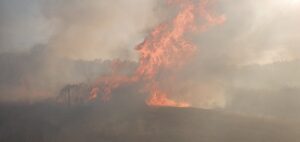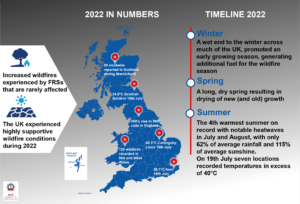Wildfire Aware
Many people may be unaware of the risks associated with fires in the open. Even a small fire can lead to a wildfire. Educating individuals, organisations and communities as a whole about these risks can go a long way to forging an understanding of how these behaviours contribute to the problem, and how modifying them forms part of the solution.
Wildfires often result in sustained and prolonged operations by UK fire and rescue services and other partner agencies. Although many fire services are well-versed in dealing with these incidents, the impact of climate change means that we have seen an increase in wildfires and the wildfire season lasting longer in recent years.

Image courtesy of Hampshire and Isle of Wight Fire and Rescue Service
What is a wildfire?
Not all outdoor fires are wildfires.
Currently, there is no single definition of what constitutes a wildfire and categorisation varies across different agencies.
NFCC’s Operational Guidance definition of a wildfire meets one or more of the following:
- Involves a geographical area of at least one hectare (10,000 square metres)
- Has a sustained flame length of more than 1.5 metres
- Requires a committed resource of at least four fire and rescue service appliances/resources
- Requires resources to be committed for at least six hours
- Presents a serious threat to life, environment, property, and infrastructure.
Level 1 Wildfire eLearn
NFCC members can access the course, which has been created to equip fire and rescue service personnel with knowledge and awareness of wildfires. Its purpose is to promote consistent response and suppression practices, facilitate cross-border mutual aid, and ensure safe systems of work.
Why is NFCC concerned about wildfires?
Wildfires have become an increasingly common part of fire and rescue service response and prevention activities as the UK climate becomes more extreme. Wildfires are starting earlier in the season and typically lasting longer due to prolonged higher temperatures than the historic average. We are increasingly finding that wildfires can now occur almost anywhere in the country and are impacting on all fire and rescue services.

We’ve experienced wildfires crossing into the ‘Rural Urban Interface’; these are areas where vegetation that is capable of supporting a wildfire meets the built environment. The Wennington wildfire in Greater London that took place on 19 July 2022 resulted in many residents needing to be evacuated and destroyed 16 homes.
What causes wildfires?
Many wildfires in the UK originate from human activity such as :
Littering – from improper disposal of a cigarette to dropping litter, such as reflective items and glass bottles, can start a fire.
Unattended fires – campfires, bonfires and barbecues left unattended or not fully extinguished can start fires.
Deliberate fire-setting – some fires are started on purpose.
Controlled burning – these can be used to manage land but can sometimes get out of control.
Other factors and causes such as :
Weather conditions – prolonged high temperatures, low rain and humidity and high winds can all make perfect conditions for wildfires.
Natural occurrences – such as lightning strikes although wildfires caused by strikes are rare in the UK.

